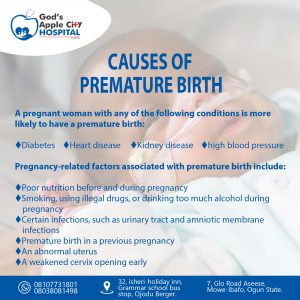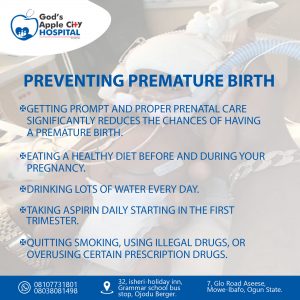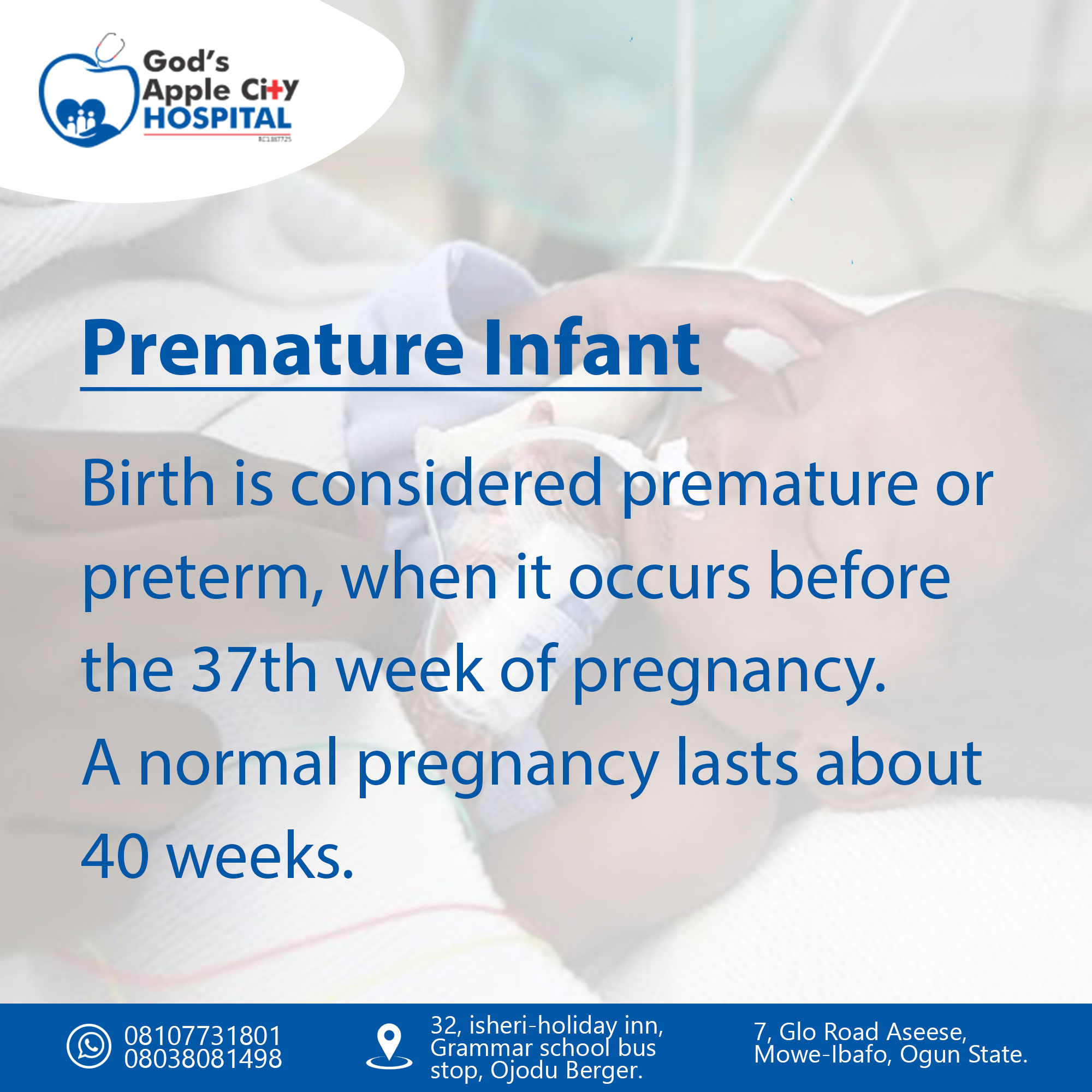Premature Infant
Birth is considered premature, or preterm, when it occurs before the 37th week of pregnancy. A normal pregnancy lasts about 40 weeks.
Those final weeks in the womb are crucial for healthy weight gain and for the full development of various vital organs, including the brain and lungs. This is why premature babies may have more medical problems and may require a longer hospital stay. They may also have long-term health issues, such as learning disabilities or physical disabilities.
In the past, premature birth was the major cause of infant death in the United States. Today, the quality of care for newborns has improved, as have the survival rates of premature babies. Yet premature birth is still the top cause of infant death worldwide, according to the Centers for Disease Control and Prevention. It’s also a leading cause of long-term nervous system disorders in children.

Causes of premature birth
The cause of a premature birth often can’t be identified. However, certain factors are known to increase a woman’s risk of going into labor early.

A pregnant woman with any of the following conditions is more likely to have a premature birth:
- Diabetes
- Heart disease
- Kidney disease
- High blood pressure
Pregnancy-related factors associated with premature birth include:
- Poor nutrition before and during pregnancy
- Smoking, using illegal drugs, or drinking too much alcohol during pregnancy
- Certain infections, such as urinary tract and amniotic membrane infections
- Premature birth in a previous pregnancy
- An abnormal uterus
- A weakened cervix opening early
- Pregnant women also have an increased chance of delivering early if they are younger than 17 or older than 35.
Potential health problems in premature infants
The earlier a baby is born, the more likely they are to have medical problems. A premature infant may show these signs soon after birth:
- Trouble breathing
- Low weight
- Low body fat
- Inability to maintain a constant body temperature
- Less activity than normal
- Movement and coordination problems
- Difficulties with feeding
- Abnormally pale or yellow skin
Premature infants may also be born with life-threatening conditions. These can include:
- brain hemorrhage, or bleeding in the brain
- pulmonary hemorrhage, or bleeding in the lungs
- hypoglycemia, or low blood sugar
- neonatal sepsis, a bacterial blood infection
- pneumonia, an infection and inflammation of the lungs
- patent ductus arteriosus, an unclosed hole in the main blood vessel of the heart
- anemia, a lack of red blood cells for transporting oxygen throughout the body
- neonatal respiratory distress syndrome, a breathing disorder caused by underdeveloped lungs
Some of these problems can be resolved through proper critical care for the newborn. Others can result in long-term disability or illness.
Doctors perform various tests on premature infants soon after childbirth. These tests help reduce the risk of complications. Doctors also monitor infants continuously during their hospital stay.
Common tests include:
- Chest X-ray to evaluate heart and lung development
- Blood tests to assess glucose, calcium, and bilirubin levels
- Blood gas analysis to determine blood oxygen levels
Treating a premature infant
Doctors often try to prevent a premature birth by giving the mother certain medications that can delay delivery.
If premature labor can’t be stopped or a baby needs to be delivered prematurely, doctors then prepare for a high-risk birth. The mother may need to go to a hospital that has a neonatal intensive care unit (NICU). This will ensure the infant receives immediate care after birth.
In the first few days and weeks of the premature baby’s life, hospital care focuses on supporting vital organ development. The newborn may be kept in a temperature-controlled incubator. Monitoring equipment tracks the baby’s heart rate, breathing, and blood oxygen levels. It may be weeks or months before the baby is able to live without medical support.
Many premature babies can’t eat by mouth because they can’t yet coordinate sucking and swallowing. These babies are fed vital nutrients either intravenously or using a tube inserted through the nose or mouth and into the stomach. Once the baby is strong enough to suck and swallow, breast-feeding or bottle-feeding is usually possible.
The premature baby may be given oxygen if their lungs aren’t fully developed. Depending on how well the infant can breathe on their own, one of the following may be used to deliver oxygen:
- Ventilator, a machine that pumps air into and out of the lungs
- Continuous positive airway pressure, a treatment that uses mild air pressure to keep the airways open
- Oxygen hood, a device that fits over the infant’s head to supply oxygen
Generally, a premature infant can be released from the hospital once they can:
- Breast-feed or bottle-feed
- Breathe without support
- Maintain body temperature and body weight
- Long-term outlook for premature infants
Premature infants often require special care. This is why they usually begin their lives in an NICU. The NICU provides an environment that limits stress to the baby. It also provides the warmth, nutrition, and protection needed for proper growth and development.
Common long-term problems associated with premature birth, especially extreme prematurity, include:
- Hearing problems
- Vision loss or blindness
- Learning disabilities
- Physical disabilities
- Delayed growth and poor coordination
Parents of premature infants need to pay careful attention to their child’s cognitive and motor development. This includes the achievement of certain skills, such as smiling, sitting, and walking.
Speech and behavioral development also are important to monitor.
Preventing premature birth
Getting prompt and proper prenatal care significantly reduces the chances of having a premature birth. Other important preventive measures include:
- Eating a healthy diet before and during your pregnancy. Make sure to eat lot of whole grains, lean proteins, vegetables, and fruits. Taking folic acid and calcium supplements is also highly recommended.
- Drinking lots of water every day. The recommended amount is eight glasses per day, but you’ll want to drink more if you exercise.
- Taking aspirin daily starting in the first trimester. If you have high blood pressure or a history of premature birth, your doctor may recommend you take 60 to 80 milligrams of aspirin each day.
- Quitting smoking, using illegal drugs, or overusing certain prescription drugs. These activities during pregnancy may lead to a higher risk of certain birth defects as well as miscarriage.

Talk to your doctor if you’re concerned about having a premature birth. Your doctor may be able to suggest additional preventive measures that can help lower your risk of giving birth prematurely.
.
.
.
.
.
.
.
https://web.facebook.com/Godsapplecity
read other blogs https://godsapplecityhospital.com/breast-cancer-signs-and-detection/

